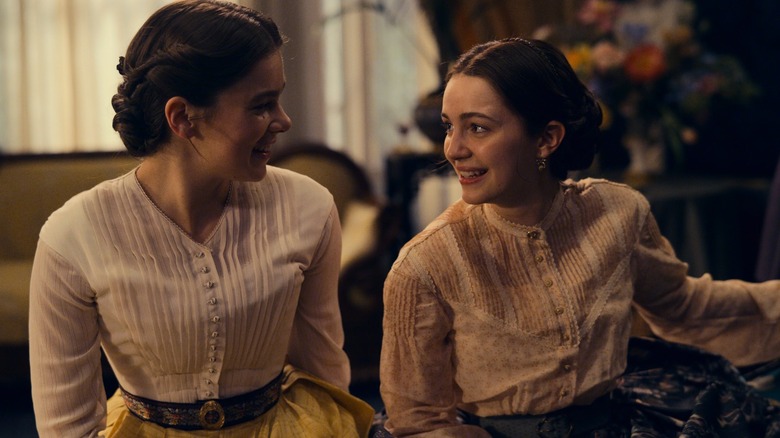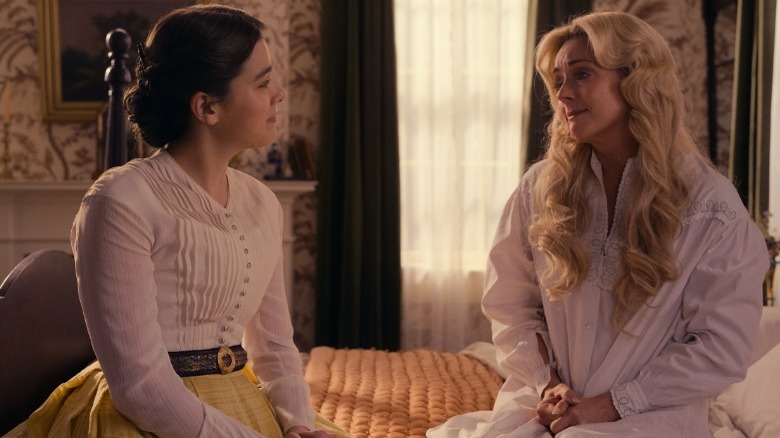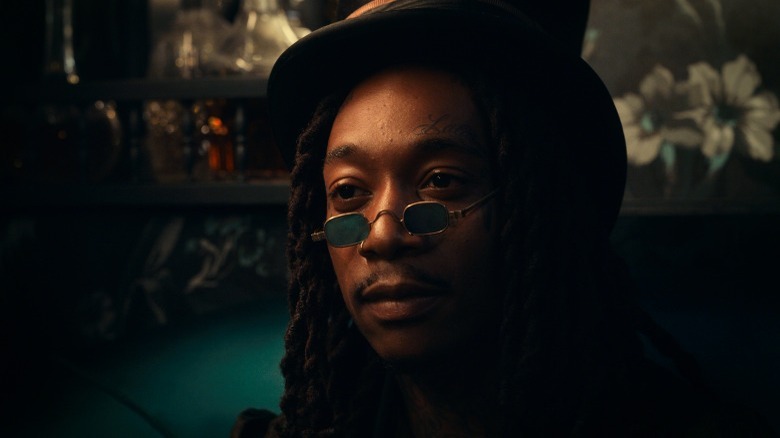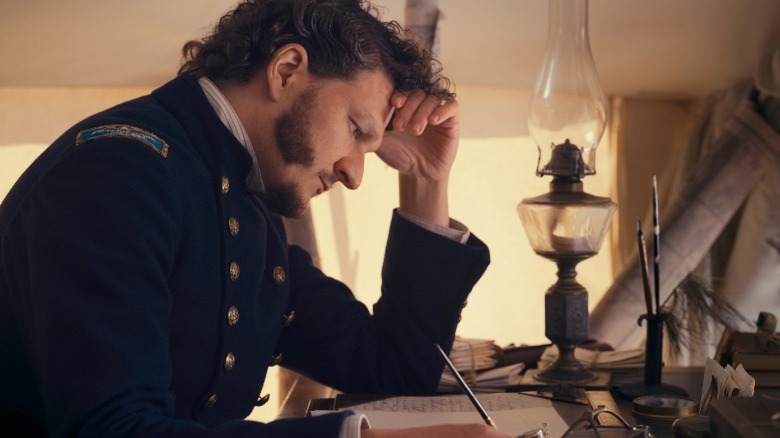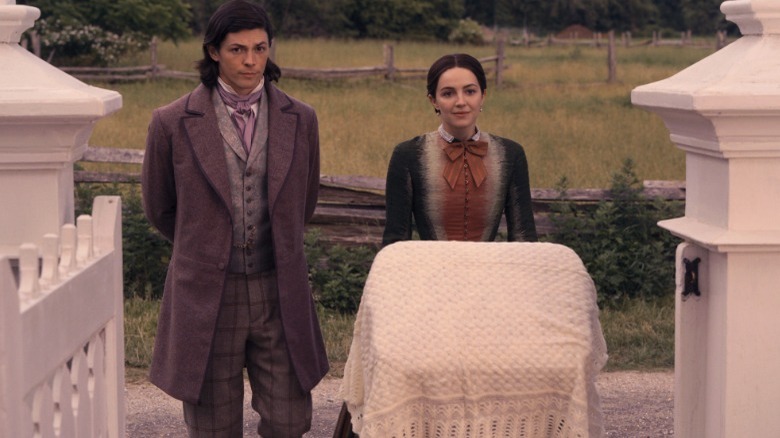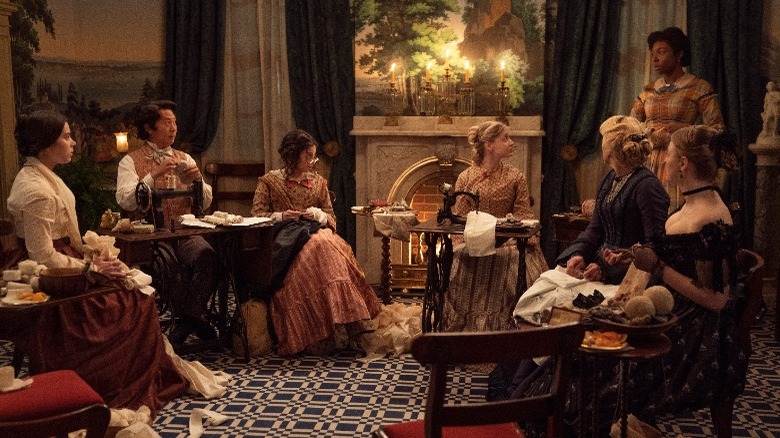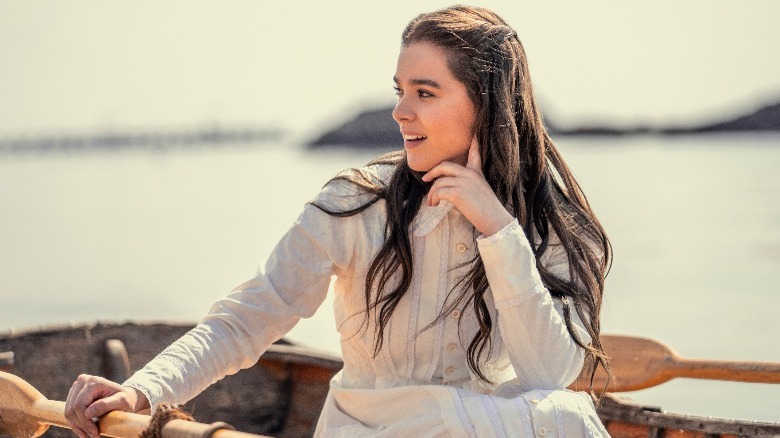Dickinson Season 3 Ending Explained: Imagination Is Freedom
When the first promos for Alena Smith's Apple TV+ series "Dickinson" dropped back in 2019, not everyone was sold on the idea. That makes sense, because it's hard to imagine how a series could paint an authentic portrait of celebrated poet Emily Dickinson (Hailee Steinfeld) while still managing to juggle elements of satire, romance, anachronistic comedy, and coming-of-age drama. Now, with the final episodes out in the world, it's clear "Dickinson” was perfectly capable of all that and then some.
The finale of "Dickinson" Season 3, titled "This Was A Poet -," ties up some loose ends, but it mostly exists as an artistic testament to the parts of Emily Dickinson that history has deeply misunderstood. The poet is most often cited in reference to her reputation for antisocial behavior, and as the show's time-traveling conversation with Sylvia Plath (Chloe Fineman) showed, Emily Dickinson's legacy as a lonely spinster is incomplete at best.
Before "Dickinson" took on the whole of its hero's legacy in the series finale, its penultimate episode granted audiences satisfying closure for a number of key characters. Fans of Emily's relationship with Sue (Ella Hunt) will find that it's actually the second-to-last episode, "Grief is a Mouse," that serves as the last word on the pair's star-crossed love affair.
Mice, Ivy, and Closure
"Grief is a Mouse" does a lot of narrative heavy lifting. Most of the Dickinson family ends their feud, with Austin (Adrian Blake Enscoe) agreeing to treat his sisters as independent women despite being named as their guardian in the family's will. Emily's mother (Jane Krakowski) also has a beautiful bit of closure when she's able to mourn her late sister by speaking to a mouse she thinks contains her spirit. "I'd know the ghost of my sister anywhere," she says seriously. "That mouse has her exact vibe." She also unknowingly rewrites Emily's legacy as a spinster in the process, telling the poet she's happy she has continued to live at home with the family and been able to spend quality time with her own sister, Lavinia (Anna Baryshnikov).
Of course, the episode's most memorable moment is the last one. Emily and her lover (and sister-in-law) Sue are reunited, and spend a languorous evening in bed together. This isn't a typical love scene; close-ups of the pair's caresses are soundless aside from Steinfeld's pitch-perfect reading of Dickinson's poem, "All the letters I can write." The intimate scene ends with Emily in a moment of ecstasy, and as the credits roll, Taylor Swift's song "Ivy" begins to play. Fans of "Dickinson" have speculated that "Ivy" is about its central relationship since the singer's album "Evermore" was released, so to hear it in context is the perfect cherry atop a fantastic love story. Sue and Emily don't share screen time in the finale, but it makes sense that this is their own finale, created in a private, perfect world just for them.
A Dance With Death
With the family war called off and Emily and Sue reaching a point of blissed-out equilibrium, "This Was A Poet -" has room to focus almost entirely on Emily and her legacy. The episode opens with her in her garden, talking to the bees and praising the flowers. In a fitting bookend to the series, she's visited one more time by Death (Wiz Khalifa), the exceedingly cool specter who haunts her imagination.
The last time we saw Death, the Civil War had him all out of sorts, but this time he's back with newfound confidence -–and some new digs. He says he's realized that no one will ever be happy to see him, but that he's come to terms with the fact that death is a part of life. "It's a cycle, baby," he says. "B****es gotta deal with that." He also encourages Emily to find an outfit that feels good to her as a poet. This is a nod to one of the real-life poet's major legacies; she was commonly known for wearing only a white dress in later years. Death and Emily dance together, a sweet little jig in a light-filled garden set to the Bakar song "Hell N Back." She's come a long way from the days when she romanticized her craving for death; the two know each other better now, and she's learned firsthand that death is so much more complicated than she imagined.
Colonel Higginson Shakes Things Up
To fans' inevitable dismay, "This Was A Poet -" doesn't actually contain much interaction between Emily and Sue. That's because the episode focuses on Emily's period of isolated creativity, which was an extended era of the poet's real life. Sue still goes to bat for Emily when Colonel Thomas Wentworth Higginson (Gabriel Ebert) arrives to meet her, though. The man, who is Emily's pen pal and a major fan of her work, is tasked with waiting for her to come down from her room. Sue works hard to make sure he's comfortable as he waits, because she knows how vital he could be to advancing Emily's career.
So far, we've mostly seen Higginson with the 1st South Carolina Volunteer Infantry Regiment, an historic military unit composed of escaped slaves. After the regiment's triumph, he leaves the Dickinsons' former employee, Henry (Chinaza Uche), in charge. It makes sense to maneuver Higginson to the Dickinsons' part of the woods for the last episode. His presence makes the Dickinson family genuinely think about their daughter as a public artist for the first time. He calls her a genius and wants to know everything about her, and the family is happy to oblige by snitching on her for talking to bees and generally being a bit of a weirdo.
The conversation Higginson inspires also leads to one of the show's most beautiful moments, which unexpectedly comes from the family maid, Maggie (Darlene Hunt). The series has never shied away from Emily's complicated legacy as a privileged white northern woman living through the Civil War, but Maggie puts Emily's poetic purpose into an even grander context that moves some of the family to tears:
"You know, it used to be said in the old Irish wars that the clans had an agreement. That no matter how bloody the war became, no matter how many were slaughtered, that they should always spare the poets. Don't kill the poets, they'd say. Because the poets had to be left to tell the story."
Happy Families of All Sorts
Importantly, Higginson also gives friend of the family Betty (Amanda Warren) all the letters she hadn't received from her husband Henry. Betty has spent the better part of the season worried Henry was dead, when in reality, he was breaking new ground by helping to lead the South Carolina Volunteers into victory. This is the only part of the "Dickinson" finale that felt a bit lacking. A face-to-face reunion between Betty and Henry may not have been realistic, but it would have been lovely to see, even if only in their imagination. Still, the parcel of love in the form of letters is a testament to the show's overarching theme of the power of the written word.
Sue and Austin also officially make up with the Dickinson family in this episode. The couple is on much better terms with one another after Austin confessed that he's been drinking to bury the guilt of paying his way out of the draft. Now, Austin asks his father, Edward (Toby Huss), if they can go back into business together to defend men who were wrongfully imprisoned while saving a woman from being sold into slavery. Sue, using an only vaguely embarrassing baby voice, also asks Edward if the couple can give their infant son his name.
This is a lot of screen time spent on a couple viewers aren't always rooting for, but the show makes it clear that Sue and Austin's newly peaceful marriage is a good thing. "Not all happy families are alike," Sue tells Austin early in the episode. She's right: Sometimes a family is a husband and wife and baby and also the husband's weird poet sister.
The Significance of Emily's White Dress
Emily doesn't ever come down to visit her guests. In an interesting choice on Smith's part, we actually never see the poet leave her room to join her friends and family again. Instead, she's preoccupied with building her legacy -– mainly in the form of a dress she can breathe in. "Inhalation is inspiration," she tells Lavinia, lamenting the way corsets make it hard to concentrate or catch a breath. When Betty comes to visit, Emily asks her for help designing the dress. They choose a design that's corset-free, buttons in the front, and of course, is white. According to Emily, it's "made of light that exists only in spring."
Emily's dress is a powerful symbol. Her story has always taken place in the domestic sphere, yet Emily has more often than not felt stifled by that setting. She and Lavinia already harnessed the power of so-called "women's work" earlier this season when they sewed bandages for wounded soldiers. Now, she'll be making her own dress. By streamlining her clothing in a way that makes it easier to write, she's casually breaking the status quo and gaining freedom in a way that's meaningful to her, if no one else. Emily even talks about her own private legacy in a sweetly emotional soliloquy, performed gracefully by Steinfeld:
"You know what? Even if I can't change the world, I'm still gonna write. Even if no one ever cares. Even if it makes absolutely no difference that there was a person named Emily Dickinson who sat in this little room day after day and wrote things down just because she felt them."
Okay, But What About The Mermaids?
The final moments of "Dickinson" are devoted entirely to Emily's creative world. We see her living in her room as the seasons change, but she doesn't treat it like the prison historians might think she did. She writes, knits, tends to a fire, looks out the window, and writes some more. Finally, she looks at a portrait of a boat, and imagines herself by the sea. In her imagination, Emily wears her perfect white dress. She feels the wind on her face, and pets a friendly dog who comes along. She comes across a small rowboat, and gets in. In the distance, colorful mermaids sit on a rock, calling to her. "Wait for me, I'm coming," she says in voiceover. The final shot of the series shows Emily, joyous and determined as she rows and rows.
The images in the final scene of "Dickinson" are pulled straight from one of the writer's poems, one titled "I started Early – Took my Dog." The rest of the poem features some ominous imagery, but this moment is focused on its adventurous beginning. With "Dickinson," Alena Smith and her team have asked us to reimagine the stuffy, depressing literary canon as we know it. They've created an image of Emily that's not one of sorrow, but of pure, unfiltered imagination.
We've seen again and again that Emily's desires are restricted by the limitations of her period in history, and especially by her role as a woman. Yet in the end, "Dickinson" shows the ways poetry can work as an escape — not away from something, but to something. Emily's life as we've left it is a good one, but no amount of earthly satisfaction will stop her from sticking her head in the clouds. Who are the mermaids, and what will she say to them once she reaches their shores? "Dickinson" leaves these answers up to our own imagination. After all, it's our greatest gift.
